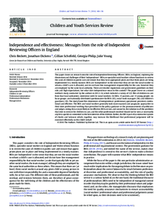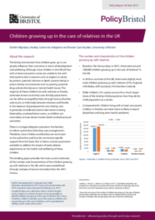Displaying 281 - 290 of 608
The purpose of this study was to assess the challenges affecting orphans and vulnerable children (OVCS) in Embu County.
This review aims to systematically review methodological challenges and limitations of interventions designed to help carers meet the needs of children in alternative care, to provide an analysis of the current state of the evidence base for these interventions.
This review aims to systematically review methodological challenges and limitations of interventions designed to help foster carers meet the needs of children, to provide an analysis of the current state of the evidence base for these interventions.
This systematic review examines the comparative effectiveness of foster and kinship care interventions.
This systematic review examines the comparative effectiveness of foster and kinship care interventions for trauma.
This study contributes to current research on the behavior problems of children in foster care by analyzing a more comprehensive set of concurrent child history and contextual predictors.
This Opinion Piece traces the rise of statutory kinship care in Australia from the progressive reduction of residential care and the struggle to recruit sufficient foster carers to meet demand for protective care.
Concept mapping was used to identify the needs of grandparents who take care of their grandchildren in formal foster care in Flanders (Dutch speaking part of Belgium).
The paper draws on a mixed methods study the role and effectiveness of Independent Reviewing Officers in England.
This policy brief provides the most current estimates of the number and characteristics of the children growing up with relatives in the UK, which were established through analyses of secure microdata from the 2011 Census, highlighting analysis and policy implications of those findings.



